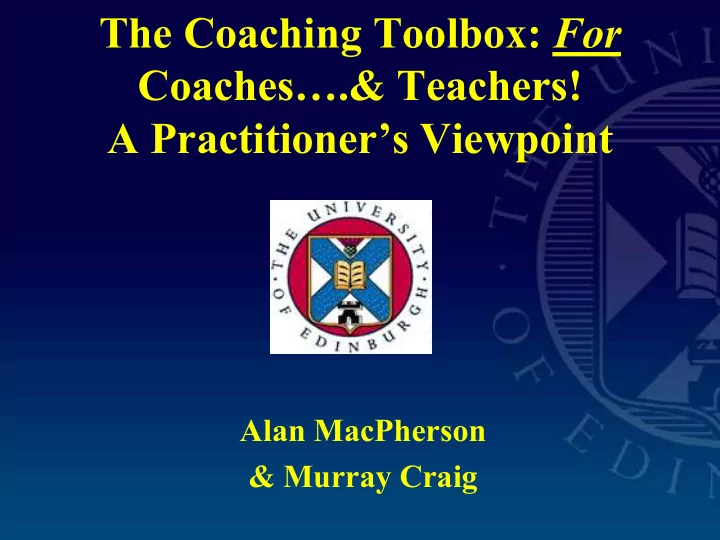

The Coaching Toolbox: For Coaches….& Teachers! A Practitioner’s Viewpoint Alan MacPherson & Murray Craig
Session Plan: Abraham & Collins’ Coaching Toolbox • Intro – Who we are and our relationship with the topic - Alan applied / research - Murray – Physical & Coach Education • Understanding knowledge(s) • The toolbox - Short explanation of the tools • Underlying theories • Q&A - How does this relate to what you do? •
Why do experts standstill, go backwards, or work hard to become and remain expert - ? Abraham & Collins (2011) “When faced with the choice between changing one’s mind and proving there is no need to do so, almost everyone gets busy on proof.” (Galbraith, 2002) Quote from Abraham & Collins (2011b)
Types of Knowledge Underpinning the Toolbox Knowledge that is difficult to tell…acquired through immersion in Tacit Knowledge a domain … composed of different experiences: Vital – yet problematic How to do – what Procedural I’m doing (Coach): Vital – yet Knowledge problematic Why am I doing what Declarative Knowledge I’m doing: Undervalued?
Toolbox Basics: How it works Offers methods / options / combinations 3 Golden Rules 1. Make the content as personally relevant as possible 2. Promote athlete understanding wherever possible 3. For rapid short- term results make the session ‘easy’; for longer-term development focused on retention/ transfer make it ‘harder’. (Abraham & Collins, 2011)
The Tools (Abraham & Collins, 2011) 1. Knowing your performer 2. Assessment Relationship & Understanding 3. Goal-setting 4. Physical guidance 5. Verbal instruction 6. Demonstration Communication 7. Q&A Skill Development Environment 8. Command words 9. Feedback 10. Practice Physical Practice Abraham & Collins, (2011a)
Coaching Toolbox – Practice Continuum Timescale - Decision Timescale - Short term Continuum Long term Expert versus Coping Demonstration Demonstration More versus Less Feedback Instruction versus Questions & Answer Consistent versus Varied Practice Massed versus Distributed Practice Abraham & Collins, (2011 a, p. 223)
Coaching Toolbox for Coaches?? Underpinning Theory • Classical Decision Making& Naturalistic Decision Making • Professional Judgement Decision Making (PJDM)
Classical & Naturalistic Decision- Making • Classical Decision Compare, contrast options in advance – Making : not time critical Recognise cues – • Naturalistic Decision adapt – to the Making Defined as: environment: time urgent Micro DM Style NDM – Intervention Knowledge Source CDM – Formal Knowledge Macro Abraham & Collins (2011b)
PJDM & The Toolbox • Exploring tacit assumptions Lewis Hatchett – Arik Armstead – Professional Cricketer 1 st Round Draft Pick • Tacit assumptions greatly influence coaching behaviour • Effective coaches looking to develop their expertise have developed a mechanism to challenge their own tacit assumptions • Experience is really useful – if you harness it! Abraham & Collins, (2011b)
Concluding Comments • Why do experts standstill, go backwards, or work hard to become and remain expert - ? Abraham & Collins (2011) • We think it’s because there isn’t always a framework for coaches to develop their declarative knowledge – and interrogate their own tacit assumptions about their coaching practise.
Useful References Abraham, A. & Collins, D. (2011a). Effective Skill Development: How should athletes’ skills be developed? In D. Collins, H. Richards, & A. Abbott (Eds.), Performance Psychology: A Practitioner’s Guide . Elsevier: Edinburgh. Abraham, A. & Collins, D. (2011b). Taking the next step: Ways forward for coaching science. Quest, 63 , 366-384. Martindale, A., & Collins, D. (2013). The development of professional judgement and decision making expertise in applied sport psychology. The Sport Psychologist , 27 , 390-398. Abraham, A., Collins, D., & Martindale, R. (2006). The Coaching schematic: Validation through expert consensus. Journal of Sport Sciences , 24 , 549-564.
Session Plan • Reflection on research (critical consumer) - common sense / uncommon practice • The study: • Upside of verbal instruction • Downside of verbal instruction
Workshop Session: Interpreting Research • Designed to determine the effect acute verbal instruction • Critical Consumer’s are - sceptical not cynical! • Work out the implications?
Acute effects of Verbal Instruction (Bobrownicki, MacPherson & Sproule).
Acute Effects of Verbal Instruction: Results (Bobrownicki, MacPherson & Sproule). Figure 1.1. Mean maximum elbow flexion averaged across Figure 1.3. Mean angular velocity averaged across participants for participants for the six experimental conditions the six experimental conditions Figure 1.2. Throwing accuracy averaged across participants for the Figure 1.4. Mean throwing time averaged across participants for six experimental conditions the six experimental conditions
Javelin Case Study • Contrasting Mental Focus between elite and international throwers • Examine the link between the variability in joint movements and reported mental focus of these two groups of athletes • What is being used by the elite thrower?
Bespoke Instruction: Javelin Case Study Variability indexes for key kinematic variables Elbow – Hip Throwers’ reported Subject Knee & hip Left knee-hip &shoulder Level &shoulder mental focus in event Comp. Training Comp. Training Comp. Training “Rhythm… just rhythm. E 1 5.0 7.1 7.8 8.1 8.1 10.9 I have to hear the music.” I have an emphasis on a I 1 14.5 9.3 9.7 5.0 5.0 14.5 ‘fast arm’ as my key point. It’s my best feature, my springiness. I try to keep that going in the event.” “I just try to keep form, I 2 17.0 15.4 15.3 13.1 13.1 9.8 stay on the floor and get a good block.” “ When I am under I 3 17.5 12.6 18.8 15.9 11.3 25.8 pressure, I always concentrate on a giving it a good ****. Get it away quickly and things stay respectable.” MacPherson, Morriss, & Collins (2008).
Bespoke Instruction: Javelin Case Study International l Standard Thrower MacPherson, Morriss, & Collins (2008)
Bespoke Instruction: Javelin Case Study Elite Standard Thrower MacPherson, Morriss, & Collins (2008)
Workshop Session: Interpreting Research • Two case studies - taken together – implications for the toolbox? • Thoughts?
Recommend
More recommend